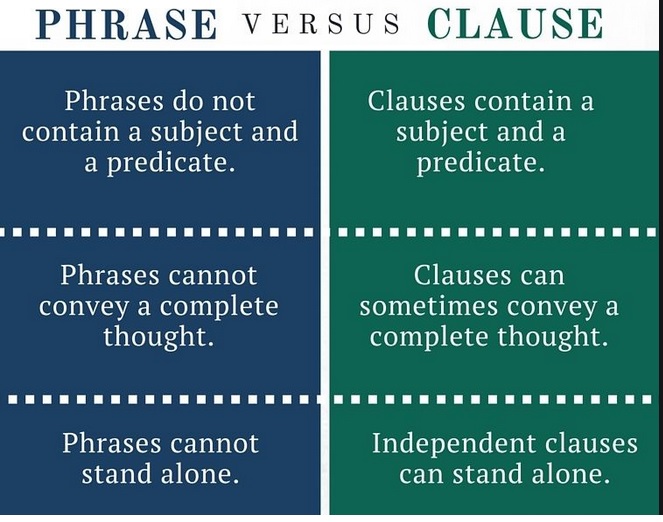Difference between phrases and clauses

English language is one of the complex language with lots of parts joined together to make a single line. A simple sentence in the English language can be broken into many different parts. As each part of the sentence is very important, any sentence without any of these parts will make the sentence wrong. New to the English language as well as experienced persons in writing the English language often get confused due to many parts present in the English language. So to lessen the confusion between these sentences we will provide the basic difference between phrases and clauses in this article.
Since phrases and clauses look almost the same it makes it incredibly difficult to differentiate between them. One of the most common mistakes made in the English language is the interchangeability of phrases and clauses. This article is mainly about how to rectify the mistakes made due to the interchangeability of phrases and clauses and also to detect whether the part is a phrase or clause. We have the best English essay experts and nursing assignment help experts who can handle all kinds of nursing essays, including nursing for lab, nursing for general purposes.
Clause:
Clauses are part of sentences that make complete sense on its own. It has a noun and verb and almost can be used as a complete sentence on its own. For example, the sentence “Ram eats” is a complete sentence and can be used independently hence it may be said that all sentences are a clause. Clauses are an important part of any sentence as it makes the sentence complete. Also, more than one clauses can be used together to make sentences more narrative. Some of the examples of clauses are given below:
- Alina is thirsty.
- She is not feeling good today.
Clauses can be divided into two parts:
- Independent clauses: The clauses which can complete a sentence and make it meaningful on its own are known as independent clauses. They can also be said as simple sentences. Here are some examples of independent clauses:
- She will give him some of her food.
- We will agree to it.
- Dependent clauses: The clauses which are not able to make complete meaningful sentences on its own is called dependent clauses. These types of clause must be used with another clause to make the sentence complete. The examples of dependent clauses are given below:
- Although she is thirty….
- Whatever they decide,….
Phrases
Phrases are part of a sentence that doesn’t have subject-verb. It is incomplete and can never be completed without the use of clauses. It can only be used as a part of a sentence. It is mainly used as part to emphasize something. It can be used sometimes as adverbs, sometimes as adjectives, sometimes as prepositions, etc. The behavior of any phrases depends mainly on the person’s mind and it can be used as anyway desired by the author. Some of the examples of phrases are :
- Worst enemy ( used as a noun )
- Giving help ( here the phrase is used as adjective )
- With the red top ( here it is used as an adjective but it is a preposition )
- For 80 nights ( here the phrase is used as an adverb)
Struggling with assignments? Get the best assignment help from assignment hippo at affordable prices. Assignment Hippo is the premier and top-rated assignment help provider in all subjects including English essays, literature English assignment help, Management, engineering, computer science, and programming, etc.